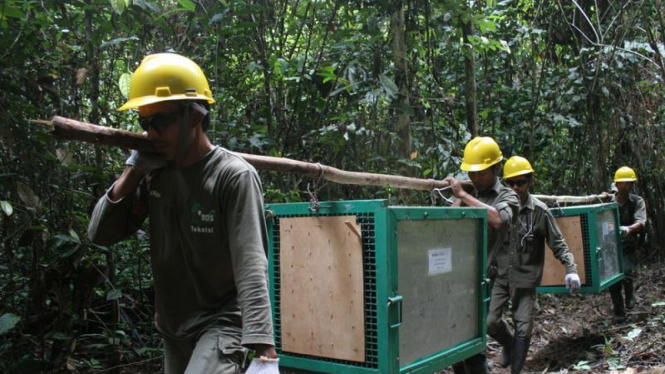- Antara/Regina Safri
VIVAnews – Six orangutans were released in the jungle of Kehje Sewen in East Kutai District, East Kalimantan. The species’ population is endangered because of recent hunts.
Three ministers participated in the process on Sunday: Coordinating Minister for the Economy, Hatta Rajasa; Minister of the Environment, Balthasar Kambuaya; and Minister of Forestry, Zulkifli Hasan.
The Borneo Orangutan Survival (BOS) Samboja Foundation revealed that the species’ release to the wild was the first in a decade. East Kalimantan, the species’ main habitat, is turning unsafe for the orangutans, which has become the main obstacle for the release.
“BOS returns back these orangutans to State,” Bungaran Saragih, Chairman of BOS Foundation, told VIVAnews.
There are 2 points of release for the orangutans: the jungle of Kehje Sewen in East Kutai District, East Kalimantan, and the region of Kutai Kartanegara. Three orangutans released in Kehjen Sewen were transported using the Air Force’s helicopter.
“I am glad that our orangutans are finally returned to where they’re supposed to be,” said Hatta Rajasa.
Then, there were three 8-year-old young orangutans transported by a helicopter to East Kutai. Each of the three is called Casey, Lesan, and Mail. They are kept in a special cage. Prior to the release, they will be trained to adapt with the new environment for three days.
“They will be released to the wild next Tuesday,” said Saragih.
In addition to the depleting habitat, the orangutans are also threatened by the increasing rate of hunting. They are considered as ‘pests’ by owners of oil palm plantations. Hunters are promised to gain Rp1.12 million for every orangutan killed.
Constant deforestation has also reduced the orangutan’s habitat. Their number has declined from 250,000 orangutans several decades ago to only 50,000 in the wild today.














